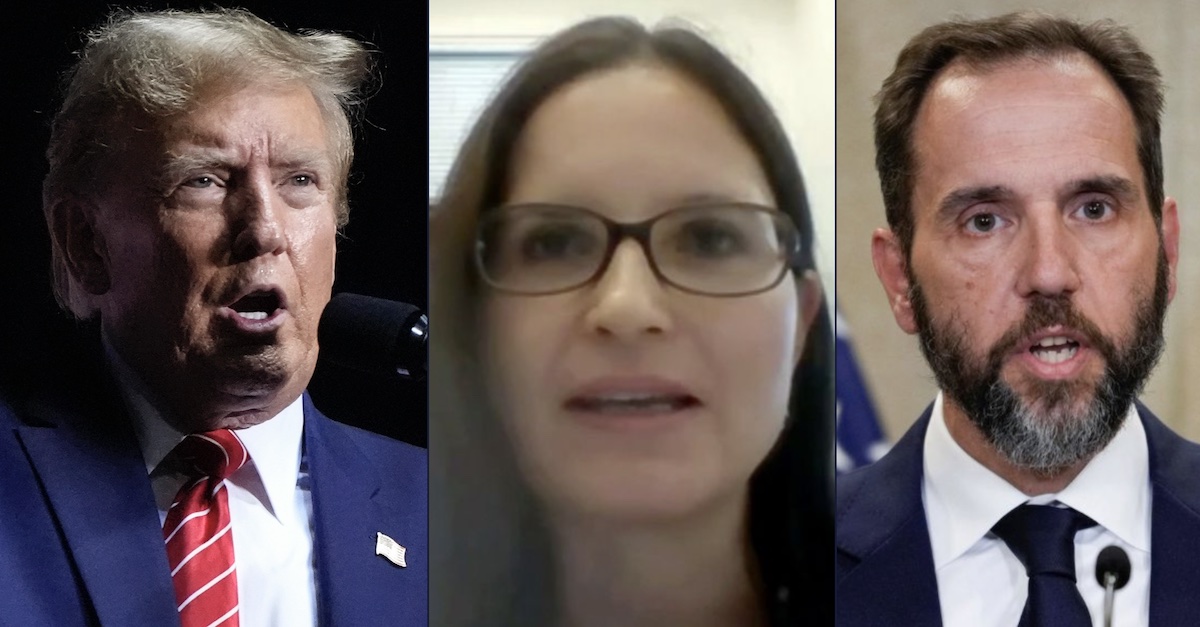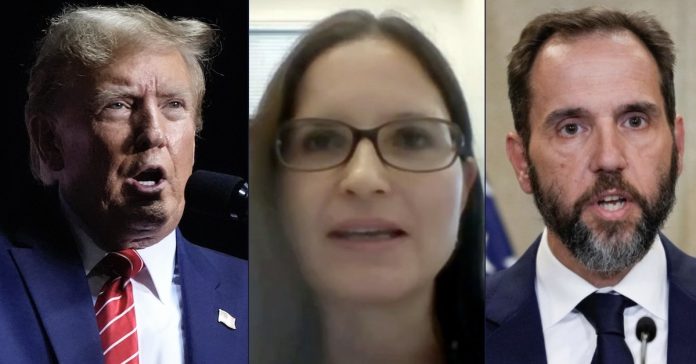
Donald Trump (AP Photo/Mike Stewart), File), U.S. District Judge Aileen Cannon, special counsel Jack Smith (AP Photo/J. Scott Applewhite, File)
Lawyers were left scratching their heads over the Mar-a-Lago trial judge’s Monday order asking the prosecution and defense to propose jury instructions under the assumption that the Presidential Records Act (PRA) allowed former Donald Trump to unilaterally decide that classified documents were personal.
Unsurprisingly, the reaction to U.S. District Judge Aileen Cannon’s order was swift and unequivocal, with some pointing out that likelihood of acquittal has gone up.
Conservative lawyer George Conway called the order the “most bizarre” he’s ever seen a federal judge docket, leapfrogging two other orders Cannon has already issued in the case.
“In the decades that I have been a lawyer, this is the most bizarre order I’ve ever seen issued by a federal judge,” Conway said. “What makes that all the more amazing is that the second and third most bizarre orders I’ve ever seen in federal court were also issued by Judge Cannon in this case.”
Conway’s criticism was in response to a post by former Obama administration “Ethics Czar” Norm Eisen, who wrote that the order was “clumsy & amateurish” and ignored the “different body of law” that governs classified documents, “including EO 13526.”
Since a motion hearing last week, Cannon has rejected Trump’s motion to dismiss on grounds of Espionage Act “unconstitutional vagueness” — without prejudice, meaning the defense can raise it again later and “as appropriate in connection with jury-instruction briefing and/or other appropriate motions.” But the judge has not yet ruled on the other argued motion to dismiss, under the Presidential Records Act (PRA).
When special counsel Jack Smith submitted his arguments, he, like Eisen, emphasized that executive order 13526 — “in force throughout Trump’s Presidency and through the allegations in the Superseding Indictment” — states that classified materials “can be accessed only by a person who an appropriate United States official determines is eligible for such access; who has signed an approved non-disclosure agreement; and who has a ‘need to know’ the classified information.”
“Under the provisions of EO 13526, the Superseding Indictment alleges, once Trump left office, he no longer had authorization to possess classified information, he never received a waiver entitling him, as a former President, to possess it, and he stored documents at a location that was not an authorized location for the storage, possession, review, display, or discussion of classified documents,” the special counsel said, rejecting the notion that the PRA allowed Trump to declare, by fiat, that national defense information documents were merely personal belongings.
Now, Cannon has ordered the defense and the prosecution to file, by April 2, “proposed jury instructions limited to the essential elements” of the 32 willful retention of national defense information counts Trump faces — but in light of the PRA. She ordered the two sides to “engage with” two “competing scenarios and offer alternative draft text that assumes each scenario to be a correct formulation of the law to be issued to the jury [.]” The latter scenario would plainly pave a path for acquittal:
(a) In a prosecution of a former president for allegedly retaining documents in violation of 18 U.S.C. § 793(e), a jury is permitted to examine a record retained by a former president in his/her personal possession at the end of his/her presidency and make a factual finding as to whether the government has proven beyond a reasonable doubt that it is personal or presidential using the definitions set forth in the Presidential Records Act (PRA).
(b) A president has sole authority under the PRA to categorize records as personal or presidential during his/her presidency. Neither a court nor a jury is permitted to make or review such a categorization decision. Although there is no formal means in the PRA by which a president is to make that categorization, an outgoing president’s decision to exclude what he/she considers to be personal records from presidential records transmitted to the National Archives and Records Administration constitutes a president’s categorization of those records as personal under the PRA.
The attorney reactions only amped up from here, with some suggesting that Smith may have enough to seek the “extraordinary remedy” of a writ of mandamus from the U.S. Court of Appeals for the 11th Circuit, a court that has had to overturn Cannon’s decision-making before.
Former special counsel Robert Mueller’s ex-top lieutenant Andrew Weissmann said that mandamus should be on the table for Jack Smith after Cannon’s latest bit of “legal inanity.”
“This is the kind of legal inanity that could lead Jack Smith to seek to mandamus Judge Cannon- ie to get the 11th Circuit appeals court to hear this and reverse her for the third time- which could also be the proverbial three strikes and you’re out,” Weissmann said.
This is the kind of legal inanity that could lead Jack Smith to seek to mandamus Judge Cannon- ie to get the 11th Circuit appeals court to hear this and reverse her for the third time- which could also be the proverbial three strikes and you’re out. https://t.co/dMjhf9bm6q
— Andrew Weissmann (weissmann11 on Threads)? (@AWeissmann_) March 18, 2024
Weissmann repeated this on MSNBC.
“There’s a reason you’ve never seen anything like it,” Weissmann said, before dropping two M-words: the first was “meshuggenah,” describing the order, and the second was mandamus.
“Please draft a jury instruction assuming that the earth is flat. And the second one is please draft a jury instruction that the earth is square,” Weissmann characterized the order. “And so, the second M-word is mandamus. Mandamus is the ability — it’s not an appeal. It’s for extraordinary actions by a district court that so clearly violate the law that you can appeal it right then and there.”
“What she did today is so nutty,” he added.
National security lawyer Bradley Moss, also appearing on MSNBC alongside Weissmann, cautioned against seeking mandamus right away.
“So, Jack Smith, if he doesn’t take Andrew up on his idea of seeking mandamus, and I actually don’t think they’re going to do that yet, I think they’re going to try to fashion a response to this to basically say ‘Alright, judge, I’m not sure where you were going with that, but um, no, that’s not how this works. If you think that’s the state of the law is what you put in that second line item, that’s fine. Issue a ruling, grant Trump’s motion to dismiss, as he outlined it under the Presidential Records Act, and will take it to the 11th Circuit,”” Moss said. “But that’s an issue of law for the judge, that’s not an issue for the jury.”
“There’s nothing for then jury to do with that instruction. If that is what they went to trial with, I was Trump’s lawyers I’d sit there and take a nap through trial, play Candy Crush, and then the moment the government rested, ‘I move for a directed verdict for acquittal’ because you can’t lose,” he continued. “Because the jury instruction automatically grants you a win.”
Moss suggested Smith will push back on the order before seeking mandamus. The attorney separately called the second scenario posed by Cannon “legally insane.”
This Order makes no sense. I cannot fathom how these are legal issues for the Court to decide and not questions of fact for any jury. https://t.co/xksghbgKd6
— Mark S. Zaid (@MarkSZaidEsq) March 18, 2024
Attorney Robert Kelner viewed the mandamus route “unlikely” at this stage, but he still regarded the order as “sufficiently bonkers” to make Smith think about it.
While it’s unlikely, it seems to me Cannon’s latest order is sufficiently bonkers that Jack Smith might at least entertain the thought of a mandamus motion. I doubt he’ll do it. But he’s got to be thinking about it.
— Robert Kelner (@robkelner) March 18, 2024
George Conway scathingly chimed in again by saying it’s clear to him that Cannon has no idea what she’s doing as a lawyer, let alone as a judge.
Apart from whether or not Judge Cannon is trying to help Trump here, this order makes clear beyond peradventure that she has no idea what she’s doing even simply as a lawyer. https://t.co/P1QrbenI1O
— George Conway (@gtconway3d) March 18, 2024
Smith has already threatened to appeal if Cannon separately refuses to reconsider a “clear error” that could out government witnesses through discovery, but the judge has not made a ruling on that issue either.
The special counsel made waves once before by seeking a rarely granted writ of certiorari before judgment from the U.S. Supreme Court on Trump’s claims of “absolute immunity” from prosecution in his Jan. 6 case, so perhaps the Special Counsel’s Office wouldn’t shy away from pursuing similarly extraordinary relief.
Read the order here.
Have a tip we should know? [email protected]

